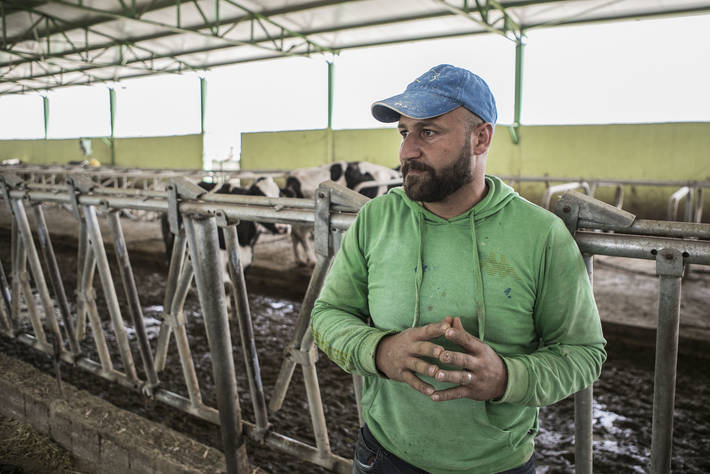Countries
Solidarity campaigns
Farmers, frontline defenders against antimicrobial resistance

Farmers have a vital role to play in stemming the spread of antimicrobial resistance among disease-causing pathogens, and can make a significant contribution simply by adopting good hygiene practices during their day-to-day farm operations.
This is the message that the UN's Food and Agriculture Organization (FAO) is stressing this week, as the international community marks World Antibiotic Awareness Week.
The responsible use of antimicrobial medicines is not just an issue in the human health arena.
Antimicrobials are also widely used for domestic animals and on fish farms and are even dusted on crops and fruit orchards to combat infections that affect animals and plants grown for food.
These life-saving medicines are sometimes added routinely to feed, even when animals are already healthy, to try to stave off infections and fatten animals faster. This poses a number of problems, which is why FAO is calling on farmers to replace this poor practice with better hygiene measures to prevent infections and extend the lifespan of antimicrobials - a critical, limited resource.
Improper use of antimicrobial medicines, such as antibiotics, in both human and animal healthcare has contributed to an increase in the number of disease-causing microbes that are resistant to these treatments, developing antimicrobial resistance (AMR) which renders them useless for curing some infections.
This means that diseases which can affect people or animals (or both) - and which can cause serious economic damage to farmers - are more difficult, sometimes impossible, and frequently more expensive to treat.
"Antimicrobial resistance is a concern for all of us," said FAO Assistant Director-General Bukar Tijani.
"There are over 7 billion consumers in the world, and food safety and quality are paramount to success in meeting many of the 17 Sustainable Development Goals," he added.
Farmers are the frontline defenders
"When we use antimicrobials excessively on farms, we're contributing to the spread of AMR, as resistant pathogens move into the environment through animal waste and farm runoff," said Juan Lubroth, FAO's Chief Veterinary Officer.
"They can even contaminate our food systems and market chains, moving from the fields and stables to our tables," he noted.
Lubroth called farmers "one of the important frontline defenders" in the battle to contain the growing threat of AMR.
There are three simple steps farmers can take to make a major difference, he said, and although stronger infection prevention measures take some investment, cleaner farming can also yield better profits.
These steps include practicing good farm hygiene, getting veterinary advice before buying and using antimicrobials, and comparing notes with neighbours in order to spread best practices. He also underlined the role farmers must play in demanding quality animal feed without added antibiotics or other antimicrobials.
Top tips for good farm hygiene
- Clean stalls, coops, fish tanks, and farm equipment regularly to get rid of the germs that can make animals and people sick.
- Wash hands and boots thoroughly before and after contact with animals and change your clothes and shoes when working with livestock.
- Keep animal housing and outside areas clean and waste-free - clear manure and bedding often.
- Control who can come into contact with your animals and make sure they clean up before and after doing so.
- Practice the "all in, all out" approach. This means raising animals of the same age at the same time, and keeping these generations of animals together at all stages of production. This makes it easier to contain waste and clean farms when they are moved or sold.
- Keep feed dry and stored safely away from potential sources of germs like rodents.
- Keep animals dry and comfortable with plenty of space. Lowering animal stress reduces their risk of infection. So does feeding them well and making sure they have clean water.
- Vaccinate in consultation with your vet. Timing matters.
- Separate animals when they get sick to prevent disease spread, and seek veterinary advice right away to get the correct diagnosis and treatment.
One person dies every minute from a drug-resistant infection, and without global action, this number will only rise. By 2050, the growing AMR threat will cost the global economy an estimated $6 trillion dollars every year.
AMR also has major implications for food safety, food security and the livelihoods of millions of farming households across the planet, who can ill afford production losses, the costs of caring for sick animals, or the loss of their livestock.
"If we are to feed a growing population and keep antimicrobials working," said Lubroth, "we need to invest in our farmers and food production systems to shift to more sustainable agricultural practices."
FAO is working around the globe to help governments, agricultural and animal health authorities, and livestock producers build their capacity to address AMR, with strong support from the United States Agency for International Development (USAID), the Russian Federation's Ministry of Health, the Norwegian Agency for Development Cooperation, and the United Kingdom's Fleming Fund as well as from China, France, the Netherlands, Norway and Sweden.
Source: FAO
